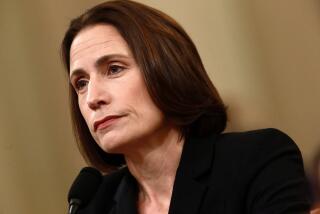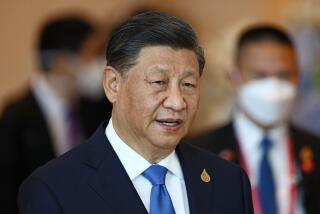Soviet Union on Brink of Chaos, CIA Chief Asserts : Upheaval: Gates says another coup attempt cannot be ruled out. He adds that the turmoil could lead to a breakdown in command and control of nuclear forces.
- Share via
WASHINGTON — CIA Director Robert M. Gates told lawmakers Tuesday that the Soviet Union stands on the brink of the worst civil disorder since the 1917 Bolshevik Revolution and that the chaos could have dangerous repercussions for the entire world.
“There is no precedent for an empire as vast as that of Russia or the Soviet Union imploding so suddenly,” Gates said in an exceedingly bleak assessment before the House Armed Services Committee.
He said that the possibility of another right-wing coup attempt “cannot be ruled out.” Further, the likelihood of economic and social chaos in the Russian Federation and the other republics this winter raises the possibility of a breakdown in the command and control system for Soviet nuclear forces.
For now, the center retains “effective” control over the Soviet arsenal of about 27,000 nuclear weapons through a system operated by the Ministry of Defense and the general staff, Gates said. But the center, he added, is “evaporating before our eyes.”
As Gates detailed his pessimistic views, Robert Strauss, the U.S. ambassador to Moscow, warned in another setting that the Soviet military is increasingly restive and said that the current situation is ripe for the emergence of a dangerous demagogue who could lead the nation into a suicidal civil war.
While the newly confirmed CIA director said that the collapse of communism in the Soviet Union and elsewhere offers reason for “considerable hope and optimism” over the long run, he warned that the world faces a “dangerously unstable” transition period as it watches the “arsenal that used to be a country” unravel at an alarming pace.
Gates’ assessment of the tumultuous changes convulsing the Soviet Union came in both open and private briefings for lawmakers, who interrupted their winter recess to return to Washington after Sunday’s announcement by the leaders of the Russian Federation, Ukraine and Belarus (formerly Byelorussia) that they are merging their three republics into a new Slavic commonwealth.
Gates’ views were far more pessimistic than the public statements of President Bush and Secretary of State James A. Baker III, who have offered vague, cautious remarks about the turmoil in the former Soviet empire since the three republic leaders declared the Soviet Union “dissolved.”
In Chicago, Bush struck a restrained tone when asked about the struggle for power in the crumbling Soviet Union, noting: “There’s a lot at stake for the American people in a peaceful evolution over there. We want to be sure the problems that affect the American people and the rest of the world are properly handled.”
The President said he and his aides are “following developments over there very carefully,” but he refrained from further comment and earlier in the day fended off a questioner who asked whether he believes Soviet President Mikhail S. Gorbachev will survive.
“Things are still very much in flux,” White House spokesman Marlin Fitzwater noted, saying the Administration has made no further decisions about whether to extend diplomatic recognition to the new commonwealth.
Strauss, speaking to the American Committee on U.S.-Soviet Relations, expressed doubt that the new alliance will survive, saying it enjoys “less than 100% enthusiasm” within the republics themselves.
He said that in other Soviet regions that are not included, “People are beginning to wonder and say: ‘Well, no one was consulted, we weren’t asked. Three people did it.’ I think that’s a problem they have in selling this new commonwealth. And it’s going to be a very difficult problem. . . . My judgment is that it will get worse before it gets better.”
Strauss also said that the allegiance of the 3.7 million-member Soviet military is a “wild card” that could determine whether the current political tension will be resolved peaceably.
“We haven’t heard a word from the army over there,” he said early Tuesday. “There are millions of men that are terribly unhappy and frustrated and hungry and homeless,” a situation “made to order for any of several first-rate demagogues they have.
“Their demagogues are as good as our demagogues, almost mouth the same words. And it’s a dangerous thing. There are others over there we haven’t heard from. Other forces will thrive in this,” Strauss said.
Gates told lawmakers in a closed session after his public testimony that Gorbachev has rejected the dissolution of the Soviet state but is “losing out” and appears powerless to prevent it.
“He will have to either resign or be a figurehead only because he doesn’t have any force behind him,” Rep. William L. Dickinson (R-Ala.), the committee’s ranking minority member, said after the briefing.
Emerging from the classified session, which lasted more than two hours, Armed Services Committee Chairman Les Aspin (D-Wis.) also voiced alarm over the possibility that central control over the Soviet nuclear arsenal may lapse, if, as Gates predicted, the Soviet armed forces fragment and divide into factions loyal to the republics.
“What we are dealing with here is a very, very dangerous situation as far as the nuclear weapons are concerned,” Aspin said. “The situation is very fluid. . . . We don’t know where it’s going to come out.”
Dickinson added that he came away from the closed briefing with the impression that the United States is no longer certain who controls the Soviet nuclear arsenal. “They really don’t know what the control mechanism is, what is involved with the black boxes . . . how many there are and who’s got them now. We think we know, but we’re really not sure,” he said.
U.S. officials said Tuesday that the vast majority of Soviet nuclear weapons are now in the three Slavic republics and Kazakhstan. But several hundred short-range tactical nuclear warheads are believed to remain in the central Asian republics of Turkmenistan, Uzbekistan, Kyrgyzstan (formerly Kirghizia) and Tadzhikistan.
Gates said the readiness of the Soviet armed forces is now so low that he does not foresee a military threat emerging over the near term. “Soviet general-purpose forces are losing their cohesion. Readiness is at its lowest level in decades,” with food, fuel and housing shortages undermining morale and discipline, Gates said.
But a much greater risk, he added, is the likelihood of unauthorized nuclear proliferation, if the republics that want to dismantle the weapons stationed on their soil are overtaken by social upheaval.
“Even if republic governments retain tight control over their arsenals, economic conditions will tempt them to sell weapons to the highest hard-currency bidder,” Gates said, adding that the “hunger for hard currency could take precedence over proliferation concerns, particularly among republics . . . with high concentrations of defense industry and little else that is marketable.”
Several countries, Gates noted, already possess missiles and rockets capable of delivering a nuclear warhead, and if one of them obtained a few warheads “from a renegade Soviet element . . . it would instantly become a nuclear power.”
Citing the CIA’s equally bleak long-range forecast for the proliferation of nuclear and chemical weapons, Gates added that “over the next decade we expect chemical-tipped mobile short-range missiles to become widespread from North Africa through South Asia.”
In his unclassified remarks to the panel, Gates listed several dangers that the CIA believes the former Soviet republics will face this winter as they attempt to make the transition to the democratic, market-based economies their leaders profess to want.
One is the risk that market reform will be accompanied by inflation and unemployment that could ignite “a social explosion” that would in turn trigger another military coup attempt like the one that almost deposed Gorbachev in August. “The possibility cannot be ruled out that such circumstances could produce a return to authoritarian government,” Gates said.
“All of the former Soviet republics face enormous economic, social and political problems” that, combined with food and fuel shortages this winter, the disintegration of the armed forces and ongoing ethnic conflicts, will “produce the most significant civil disorder in the former U.S.S.R. since the Bolsheviks consolidated power” in 1917, Gates said.
Times staff writers Douglas Jehl in Chicago and John M. Broder in Washington contributed to this report.
* GORBACHEV PERSISTS: Soviet President Gorbachev insisted he will not resign. A12
More to Read
Sign up for Essential California
The most important California stories and recommendations in your inbox every morning.
You may occasionally receive promotional content from the Los Angeles Times.










